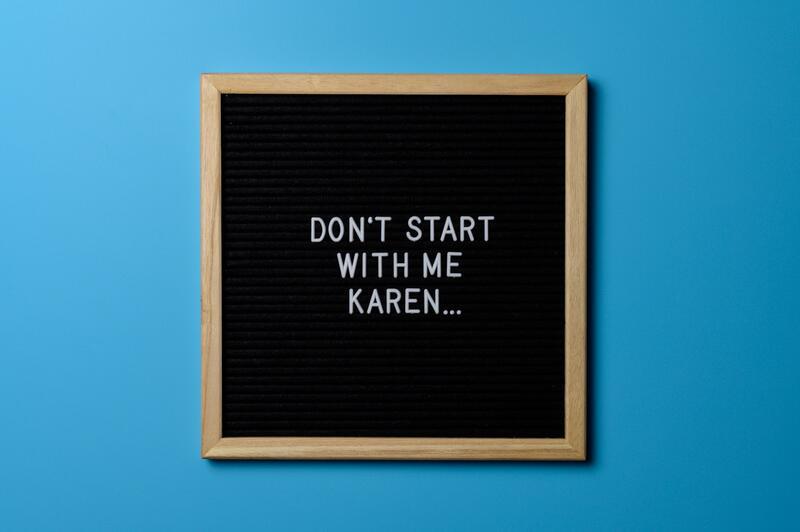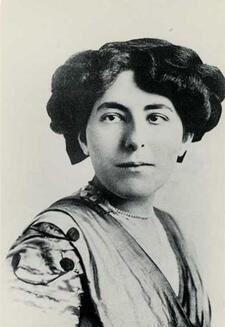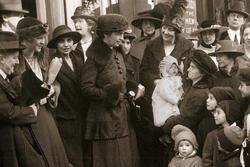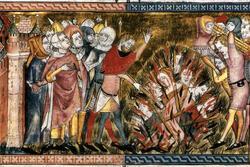Calling Out the Karens in the Jewish Community
Recently, new slang has blown up that highlights the entitlement of the middle-aged white woman, aka the “Karen.” On the Internet, Karens are mocked for their mullet-combover hairstyles and for asking to speak to the manager when their fast food order is incorrect. But as meme-able as she is, the Karen is part of a larger historical conversation about the culpability of cisgender white women in upholding white supremacy in often quieter, but no less violent, ways than white men do. Historically, Karen’s authority and gendered fear of Black men has had devastating consequences.
Perhaps most famously, 21-year-old white woman Carolyn Bryant’s accusation of unwarranted flirtation from a Black teenager named Emmett Till resulted in his lynching by a group of white men in 1955. Just a few weeks ago, another woman named Amy Cooper called police claiming an “African American man” was harassing her, actively choosing to weaponize her whiteness so she wouldn’t have to follow park rules. It was only sheer luck that Christian Cooper, the Black man she targeted, didn’t become another Emmett Till at the hands of police. White women like Bryant and Cooper, unarmed as they usually are, instead use the violence of their words to directly endanger and harm Black lives.
How can we examine the “Karen” phenomenon in a Jewish context? How do we, as Jewish women and femmes, contribute to anti-Blackness? The answer lies in the history of American Jewry. As early as the 1900s, Central European Jews (as distinct from Eastern European Jews—even within European Jewry, ethnic tensions and hierarchies existed) began assimilating into the American fold.
It is important to understand that in the American context, assimilation is synonymous with whiteness. Women like Edna Ferber, a Jewish feminist writer in the 1920s, represent a demographic of Jewish culturalists who, at the time, were navigating their own identities while also navigating their relationship with racial justice and the adjacent acculturated Black community. The 1920s was a unique period of political upheaval in the United States, ensuring a particularly violent brand of white supremacy, which heavily affected the way Black and Jewish communities functioned and interacted with each other politically. Slavery had been abolished just decades before, and two seemingly disconnected mass migrations were occurring: that of newly freed slaves from the South to the North and that of Eastern European Jewish immigrants to northern cities like New York and Chicago. The two communities lived in close quarters in these northern cities and were forced to construct their relationship in light of pressures to assimilate and to shed their Blackness and Jewishness.
As a newly acculturated Jewish artist, Edna Ferber engaged with issues of class, race, and gender in her literary works. Impacted by experiences of antisemitism in her youth, Ferber confronted identity in her novels. This profound confrontation cemented Ferber’s reputation as a radical, enduring writer: biographers and Jewish academics have praised Ferber for her socialist voice, and even JWA’s encyclopedia lauds Ferber’s “profound love of justice,” which she expressed through the construction of strong female protagonists and defiant gender roles. Edna Ferber’s own intersecting identities—“Jewish,” “woman”—and their impact on her movement in the world obviously played a role in her dedication to justice and feminist characters.
Ferber’s position on racial issues, however, are problematic, even if they’re reflective of the times. Her 1926 novel Showboat, which was later turned into a beloved musical under Jewish composer Jerome Kern and lyricist Oscar Hammerstein, centers the Hawk family and their lives on the Cotton Blossom, a traveling showboat sailing down the Mississippi River in the early 1910s. The novel captures Ferber’s fascination with salt-of-the-earth, working class America.
This fascination is epitomized through the eyes of the young daughter Magnolia, who obsessively watches the nightly audiences assembling, beholding “the moving living drama of a nation’s peasantry.” Ferber lumps Black Americans in the fold of the working class which is reflective of a perception of race as an economic class—perhaps lingering from the end of slavery—and less so a social reality. Because Black people remain a piece in the puzzle, but not individual characters, Ferber’s most visibly Black characters are minor staff whom she outwardly describes in dehumanizing and animalistic terms, drawing on the same stereotypes that led to the violent lynching of Black men in the South at the time.
The only central Black character in the storyline with any real plot development is Julie Dozier, the headlining actress in the boat’s nightly plays. Julie is described as having “sallow” coloring, alluding to her mixed heritage. Even still, Julie is so light-skinned that the news of her being a mixed African American comes as a shock to everyone. The Hawks, the owners of the showboat, turn out to be neither martyrs nor saviors, because they have Julie leave the boat the first chance they get.
Edna Ferber’s novel Showboat is an attempt to engage with the racial landscape of America, but one that maintains a romanticized and subordinate image of Black Americans. Much like Amy Cooper, whose ironic liberal political leanings have been examined by several academics like Musa al-Gharbi, Edna Ferber is a wealthy, educated white woman whose racial comprehension falls short—a “Karen.” Ferber had close ties with Black culturalists at the time, like Zora Neale Hurston who she supported philanthropically, and yet she failed to accurately underscore the developing identity discourse of the 1920s through her work. Her writings are emblematic of not only the Jewish woman’s role in racial injustice, but also of the historic Black-Jewish relationship and how white Jews may still hold patronizing views towards Black people while believing we have a stake in their liberation as Jews.
The history of white Jewish women upholding white supremacy didn’t end in the 1900s and doesn’t stop at patronizing or furthering Black stereotypes. A few years ago, beloved Jewish singer and actress Bette Midler published a tweet saying women are the “N-word of the earth,” a nod to the 1972 John Lennon and Yoko Ono song, essentially erasing the existence of Black women altogether. When I saw the tweet, my feminist Jewish heart winced. Midler grew up in a generation of feminists who promised to smash the patriarchy, but not structural racism. It was a feminism that protected the petite, feminine white body, but not the fat, Black, disabled, or trans body.
Amy Cooper weaponized whiteness in defense of herself, Ferber utilized race to enhance her storyline, and Midler co-opted racist language to uplift white womanhood. Karens operate on a spectrum of covert racism to uphold white supremacy, sometimes unknowingly. White Jews cannot avoid this reality and must interrogate the exclusivity of our language and structures within the Jewish community, which tend to standardize and center whiteness. Our sanctuaries and cultural spaces are still replete with racial microaggressions, despite the recognition that Jews are a multiracial people. In the last few weeks, Jewish publications have been churning out dozens of articles revealing horror stories from Jews of color. Chana Hall, an Orthodox-raised Black Jew from California, wrote a piece in the Jewish Journal to reflect on traumatic experiences of hearing racial slurs and being bullied in her Jewish day school as a child, forcing her to eventually switch schools. A single Google search of articles written by Jews of color highlights that many Jews who identify as such carry similar stories of alienation.
That’s why organizations like Jewish Multiracial Network and Be’chol Lashon stand as resources and platforms for Jews of color to express their Jewishness and have their voices continually heard—not just in moments of trauma, but in all aspects of their lives. I recommend visiting Be’chol Lashon’s website, which currently features dozens of powerful quotes from Black Jews expressing their identities and describing their struggle to liberate themselves from both antisemitism and racism. One contributor to their blog, Ayeola Omolara Kaplan, writes: “...I did everything I could to avoid being seen as a strange little Black Jewish girl. I realized that asserting my identity was a revolutionary act, as well as an act of liberation.”
I hope to see a world in which multiracial Jews are not only normalized, but also uplifted, and in which white Ashkenazi Jews work to end our complicity in white supremacy—but to achieve that, we must do more than just acknowledge our privilege. We must confront our proximity to whiteness and the responsibility that comes with that privilege on a daily basis. We must call out the Karens, or rather the Deborahs and Judys, of our inner circles. We must hold our bubbes, aunts, cousins, mothers, friends, and, most importantly, ourselves accountable for the internal anti-Blackness we undoubtedly hold. Many of us think of ourselves as feminists or liberals, similarly to Edna Ferber. We may vote blue, but how many of us praise the presence of police in our synagogues, ignoring the trauma of our Black congregants? How many of us consume Black culture and music, but don’t invest in and support Black community efforts? Anti-racism is not a political affiliation or a title; it is a daily, conscious effort to question and dismantle the white-washed beliefs our education system and culture have fed us. We are not absolved of our white womanhood just because we are Jewish, and we must begin to confront that truth if we are truly to stand with the Black community.









YUP every MF day at my job these entitled individuals continue to abuse and missuse people who serve the COMMUNITY as if they are THEIR PERSONAL SLAVE..I'm sick of it and OVER IT !!
STOP using the name Karen as an insult for other women. Every day the name Karen is being abused by other women, the same women who would publicly decry bullying while ironically being bullies themselves.
The name Karen is a word that took about a week to become a word that is more negative to the user than the person it's being used against.
Grow up ladies. It's not seventh grade anymore.
Is any innocent person out there being harassed by Jewish people and they seem to be protected by law enforcement and nothing happends to them?
You are truly amazing. Thank you for an inspiring and educational read appreciated all the way from Australia!
What a load of crap. Echo chamber much? You're using the same leftist language and jargon that they do.
My first response in reading most of the above is: Of course.
Our challenge is to think, act, speak inclusively.. knowing that commitment to all the isms is vital and complicated, but, absolutely necessary. Simultaneously, we won't all agree about the meaning of things: for example, I don't agree that Bette Midler's statement "Women are the N-Word of the Earth" erases black women. All women variously share being verbally abused. In other words, does this have to be "either" "or"? It's actually, both...in varying amounts.
Since when is it alright to hijack the name of some people and turn it into slang for a specific race and gender? Why is it seemingly acceptable to be hateful, racist and even violent toward white people? People lose jobs, families, their freedom and their lives for racist behavior directed toward anybody in society BUT WHITES. Racism is racism, Joy Reid. Saying you will only be interviewed by black reporters is racism and discrimination, Mayor Lightfoot. Yet,these disgusting behaviors haven't any consequences. It is open season on racism toward white people. Jewish people should know better, one would think.
I think that as Jews we should not join in in degrading one of our names just because it was appropriated and is seen as trendy to degrade.
I think that the author here needs to consider that using a real persons name as an insult could cause serious and lasting harm to people, not to mention it gives others implicit permission to bully others,and bullying is something we should be working against not towards.
I know the popular logic is that "if it doesn't describe you then it shouldn't bother you" but I would argue that the further it is from a description of you, the more it would bother you. A person who is a total jerk or bigot would not care about being called those things, but a person who wasn't would be thrown into a state of cognitive dissonance every time they heard it, especially if it was their own name.
Could you imagine the harmful effects of being hit with that kind of cognitive dissonance that frequently, maybe multiple times a day for months? Any psychologist would know that is a psychologically dangerous and potentially lethal situation, damaging a person's sense of self, their self-esteem, and their sense of safety. I'd say this is going to kill people, but it already has, including those very vulnerable folks known as teenagers, who, having few people with the name who are also their age, are left particularly vulnerable. This should be recognized as a potential mental health crisis in the making. People named Karen don't even have a safety net to turn to in these times of quarantine.
We should not be a part of this. It goes against everything we stand for. We should talk about privilege and entitlement, but we should not harm the innocent in doing so.
In reply to I think that as Jews we… by Kit Cassidy
Nicely said. This writer is a I. Anyone who says they are against bigotry and uses " Karen" is a bigot. There is no pick and choose when it come to racism you either are or not. You can't say I'm not racist but then use terms like "Karen" in a negative light.
In reply to Nicely said. This writer is… by Carly
Calling people Karen (rude at best) and anti-racism are two completely different things. So - yes you can; Carly Karen.
In reply to I think that as Jews we… by Kit Cassidy
Oh, please. Don't even try victimizing yourself in this.
In reply to I think that as Jews we… by Kit Cassidy
Oh, please. Don't even try victimizing yourself in this. All white women can be Karens including Jews. It doesn't affect your title.
How is it harmful?
Thank you, Karen. I see this term “Karen” as the new version of the condescending “Jewish mothers” and the devastating effects of “JAP” or Jewish American Princess” to describe the behavior of privilege on college campuses. The stereotype of “Karens” is being extended. to women of any age who dare to speak up, to talk back, far beyond the connection to the original video showing white privilege.
Thank you for this interesting approach to the subject. As Jews we certainly need to explore the many ways that we have related to the social construct of race in America. I see many white (or white appearing) Jews make comments that indicate that they have not considered white supremacy to be “their problem.” But it is our problem because it exists in our communities (both Jewish ones are the larger ones to which we belong). And because as white (or white appearing) people we benefit from the systemic racism embedded in this country. I especially appreciate the connection between Jewish immigration and the Great Migration of Black Americans to northern cities from the South. Black Americans were definitely seen as just another immigrant group at that time. There was no national understanding of Black Americans having survived a cultural genocide. Even today white people in general (and white Jews in particular) balk at any comparisons of the trans-Atlantic Slave Trade and Black enslavement in the US with the Holocaust. Of course these horrific events are entirely different in the details. But not in the fact that they were horrific and that they were enacted by one powerful group on another group of entirely innocent people. And in doing this we have to accept that a small number of the white people committing these acts of atrocity toward Black enslaved Americans were Jews. Small numbers of Jews have been in America from the beginning. And small Jewish communities were well established at the time of the American Revolution. Jews fought on both sides of the Civil War. Their were Jews in the South who owned slaves. A high ranking member of the Confederacy was Jewish. This doesn’t mean Jews were also the recipients of white violence in America. It just means that the history is complicated and at times uncomfortable. Especially if you were raised to think that the Jews were always “the good guys.”
You could have written this article and made your point without resorting to this "Karen" crap. It may be trendy, but unnecessary and insulting to us Karens who are not bigots and actively espouse equal justice. How about getting more mature and serious if you want to be taken seriously.
In reply to You could have written this… by Karen Walz
My name is not Karen, but I agree with you. One might ask this author, "What about the Allisons?" Karen is also a common Jewish name ...
I think everyone should be disgusted at this use of a personal name - people complain. Men complain lots too, and regardless of color and culture. Much of this complaining is perhaps warranted. We have a right to our opinions, and most of us aren’t shy about stating them. Everyone has their own way of complaining, and generally none of it is appealing to listen to.
For most "garden-variety" serial complainers, I think we should just stick with "loudmouth", "complainer", or some similar terms, without further causing distress and alienating members of society by using personal names.
On a more serious note, I do appreciate the issues that this article has highlighted - the larger context - we must all do much better in terms of Our Humanity. To complain by ab/using race or other hateful stereotypes, or using one's societal "preferred status" to unfairly elevate oneself, or to keep others down, is disgraceful, as this author has addressed.
Unfortunately, my experiences are even more uncomfortably horrid than Ms. Abrams discusses. I was vilely threatened at my job at a powerful university and medical school where I had reported cancer data manipulations in violation of State law. When my boss threatened me, he said that I had, “complained about a lot of people”. I was fired, after 12 years, a good evaluation, and an approximately $10000 raise, within two weeks after I reported this threat in that evaluation response.
Further revoltingly, Jews (and non-Jews) have been involved in perpetrating this vileness – much worse than I am stating here, or that anyone would imagine is occurring. It is hubris, arrogance, and yes, an evil that Jews, especially, should revolt against. Unbelievably, some Jews take issue with me voicing concerns regarding this institution (although others are appalled at them). Please go to my website, ourconstitution.info. This rise of medical-military extrajudicial terror is what WE SHOULD ALL be protesting - it is non-biased treachery, and anyone - race, religion, profession, etc., disliked, perceived as a "threat", etc. is targeted. Retaliation may be against them directly or someone they know. Harm includes high-level lethality - deaths appear as natural or at best unknown, and occur in and outside (restaurants, etc.) of medical facilities, via chemicals, biologics, carcinogens, etc.
When we have these highest levels of power accountable, and brought to constitutionality, with proper checks and balances, we will have gone a long way towards decency for people of color, and for all of us.
We should all be demanding accountability and justice. We should demand protections for patients, students, and everyone.
We should all complain mightily and demand reform and oversight, and that Eisenhower’s and Truman’s warnings are heeded, NOW.